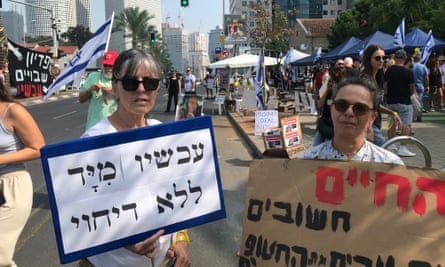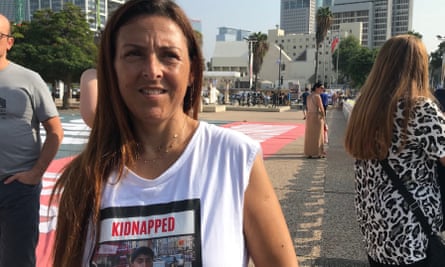Israel’s defence ministry headquarters used to soar over Tel Aviv as a symbol of might but for the families of hostages now gathered beneath it the building has become a focal point of anguish.
Relatives filled the plaza opposite the 17-storey Matcal tower on Saturday to demand that a state founded to protect Jews respect that covenant by doing everything possible to save the captives in Gaza.
The escalation of Israel’s assault on the enclave stoked dread that their loved ones were on the receiving end of tank shells and air force bombs, or reprisals by Hamas captors, and raised agonising questions: had the government abandoned all hope of negotiating releases? What was the army’s strategy to free hostages? Was there a strategy at all?
“Is there a plan? We don’t know. That’s what we want to find out,” said Haim Rubinstein, a spokesperson for the Hostages and Missing Families Forum, as families and supporters met and hugged under a blazing sun.
“We also want to know the meaning of what happened last night,” said Rubinstein, referring to the ground incursion into Gaza by Israeli troops and the bombardment of 150 Hamas underground targets – including tunnels that might host some of the 229 hostages Israel believes are in Gaza.
After three weeks of complaints that the government has failed to consult and update relatives the protest put pressure on the prime minister, Benjamin Netanyahu, into agreeing to meet them on Saturday evening.
He assured them the government would “exhaust every possible option” to bring hostages home while waging war on Hamas. “This is an integral part of the goals of the operation, as we defined them. It’s not just rhetoric,” he said.
The families lobbied for a deal to swap hostages for Palestinian prisoners. “He didn’t dismiss us. He will take everything we said into consideration,” said Yigal Serussi, the father of one captive. Merav Leshem-Gonen, the mother of another hostage, implored Netanyahu to not take any action that would jeopardise the captivers. “We said blunt things,” she said later.
Earlier on Saturday Hamas expressed openness to a deal. “The price to pay for the large number of enemy hostages in our hands is to empty the prisons of all Palestinian prisoners,” Abu Obeida, a spokesman for Hamas’s military wing, told the Al-Aqsa television channel.
At a press conference after meeting the relatives Netanyahu made no commitment to a prisoner swap. He said he sought to “abolish” Hamas and recover the hostages and that there was no tension between the two goals.
For the families near the defence ministry holding pictures of relatives, or tying yellow ribbon around benches and trees, that was an ominous statement. Last week Hamas said approximately 50 hostages died in the bombardment.
“Every day the hostages are not released they are in jeopardy,” said Zeev Scherman, whose 19-year-old nephew Ron Scherman was abducted in the Hamas onslaught on 7 October. That day the government abandoned Israelis who lived near Gaza and it now risked abandoning the survivors who were captured, said Scherman.
“Why this offensive? There is no rush. Hamas wasn’t going anywhere.” He favoured swapping the hostages for thousands of Palestinians, including Hamas militants, in Israeli jails. “All the prisoners for all the hostages.”
Shelly, 62, who held a placard that said “life matters”, echoed the sentiment. “The government owes us after they did not protect us. We should concentrate on the hostages – we should not eat or sleep until we bring them home. Hostages first. There is always time for war.”
Shirley, 56, implored Netanyahu’s administration to prioritise the captives. “It’s a second holocaust. Who knows what is happening to our babies?” The heavier the bombardment of Gaza, the more relatives worried, she said. “It’s been three weeks. We can’t bear it any more.”

For Yarid Shabibi the complexities of the conflict dissolved into a scorching yearning for the return of her 26-year-old cousin, Noa Argamani, whose abduction on a motorbike was filmed and circulated widely online. “We just want her here, that’s it.”
The families and their supporters expressed a wide range of attitudes towards Palestinians. “We want Palestinians to have a state. We are afraid for the Gazan people, we don’t want them to suffer,” said Dahlia, 62.
Ayelet Samerano, whose son Jonathan was abducted, trembled as she spoke. “My son, my little son. Those animals took him.
“They killed children in front of their parents and killed parents in front of their children.” Sleep is elusive, said Samerano. “And when I wake, it’s back into the nightmare.”

She accused the government of leaving relatives in an information vacuum but expressed confidence in the decision to attack Gaza. “I’m not worried about my army. My army knows exactly what to do.”

Emily Foster is a globe-trotting journalist based in the UK. Her articles offer readers a global perspective on international events, exploring complex geopolitical issues and providing a nuanced view of the world’s most pressing challenges.








